The Music of Chance
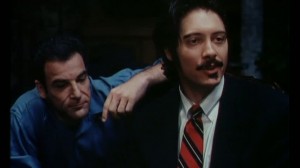 One of my least favorite terms to describe a movie/book/play is “a two-hander.” Sure, it’s a shorthand way of describing a piece of fiction that features only two characters, who are polar opposites of each other debating their particular points of view. But it’s such a reductive description, as if the story were so simplistic* that it could just be discarded and ignored altogether. It makes the points of view espoused seem trivial no matter their subject.
One of my least favorite terms to describe a movie/book/play is “a two-hander.” Sure, it’s a shorthand way of describing a piece of fiction that features only two characters, who are polar opposites of each other debating their particular points of view. But it’s such a reductive description, as if the story were so simplistic* that it could just be discarded and ignored altogether. It makes the points of view espoused seem trivial no matter their subject.
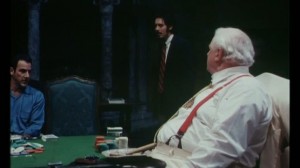 Must a story have so many twists and turns and conflicting characters that the constant zigs and zags are just too much for those of us who like our drama in the form of a “two-hander”? That would discount virtually all of David Mamet’s stage work (his films, like The Spanish Prisoner, Homicide, and Spartan tend to be more complicated plotwise). Oleanna is one of the most famous two-handers in American theater. American Buffalo is a “three-hander.” Glengarry Glen Ross is a series of two-handers. Now, when adapting a “two-hander” for the screen, one must be very careful not to make the characters sound like a bunch of essayists giving didactic speeches at each other (instead of to each other). That’s why Glengarry Glen Ross works as a movie and Oleanna doesn’t. One sounds semi-natural, the other stiff, rehearsed, and mannered.
Must a story have so many twists and turns and conflicting characters that the constant zigs and zags are just too much for those of us who like our drama in the form of a “two-hander”? That would discount virtually all of David Mamet’s stage work (his films, like The Spanish Prisoner, Homicide, and Spartan tend to be more complicated plotwise). Oleanna is one of the most famous two-handers in American theater. American Buffalo is a “three-hander.” Glengarry Glen Ross is a series of two-handers. Now, when adapting a “two-hander” for the screen, one must be very careful not to make the characters sound like a bunch of essayists giving didactic speeches at each other (instead of to each other). That’s why Glengarry Glen Ross works as a movie and Oleanna doesn’t. One sounds semi-natural, the other stiff, rehearsed, and mannered.
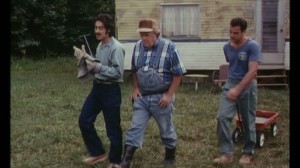 Those are the same roadblocks that must have bewildered Philip Haas (Angels and Insects) when he adapted Paul Auster’s novel The Music of Chance for the screen. This is especially true because The Music of Chance often drifts into the territory of being solely a metaphor, making the subtext just text, and removing the human nature of what we’re supposed to be seeing. And Haas does an excellent job early on in not tipping his hand, as we’re introduced to sleazy card player Jack (perfectly exaggerated by James Spader, he even develops a scuzzy style of running) and aimless wealthy drifter Jim (whom Mandy Patinkin elevates from an obvious cipher to something more interesting). Now, it can’t be a coincidence that Jack and Jim are so close to Jack and Jill, suggesting they’re a platonic couple of sorts. And Haas isn’t subtle as he gives us more and more details.
Those are the same roadblocks that must have bewildered Philip Haas (Angels and Insects) when he adapted Paul Auster’s novel The Music of Chance for the screen. This is especially true because The Music of Chance often drifts into the territory of being solely a metaphor, making the subtext just text, and removing the human nature of what we’re supposed to be seeing. And Haas does an excellent job early on in not tipping his hand, as we’re introduced to sleazy card player Jack (perfectly exaggerated by James Spader, he even develops a scuzzy style of running) and aimless wealthy drifter Jim (whom Mandy Patinkin elevates from an obvious cipher to something more interesting). Now, it can’t be a coincidence that Jack and Jim are so close to Jack and Jill, suggesting they’re a platonic couple of sorts. And Haas isn’t subtle as he gives us more and more details.
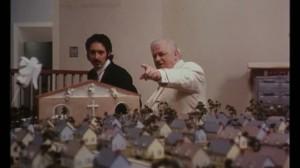 Why would Jim pick up a bleeding and disheveled Jack (in full Ratzo Rizzo mode), a stranger, on the side of the road in the middle of nowhere? Well, because if he doesn’t, Auster won’t have a way to set up the lesson he intends on giving us. What that lesson is, other than, life is very cyclical, I’m not sure (as a movie it’s all over the place), and that’s one of the weaknesses of The Music of Chance.
Why would Jim pick up a bleeding and disheveled Jack (in full Ratzo Rizzo mode), a stranger, on the side of the road in the middle of nowhere? Well, because if he doesn’t, Auster won’t have a way to set up the lesson he intends on giving us. What that lesson is, other than, life is very cyclical, I’m not sure (as a movie it’s all over the place), and that’s one of the weaknesses of The Music of Chance.
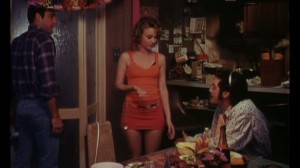 The story mostly follows the Mamet template; One agitated lowlife teams up with another gullible but honorable miscreant to involve themselves in some sort of get rich quick scheme. They screw up the plan because of a few arrogant decisions, often involving having their ego poked at or having their ego stroked, and the allegorical surroundings set up some sort of moral quandary for the more honorable one. Then there’s some sort of Sisyphean bargain offered up, which causes one of them to question their allegiance. Eventually they find themselves as pawns in a game they didn’t really understand, which is why their new bosses/overlords treat them like spoiled, temperamental children, which they were in the first place. Now The Music of Chance is more existential than Mamet, and so the dialogue tends to be more on the nose (“we’re just a couple of know-nothing dummies”), and clearly the use of a big band music score is an error of judgment because it’s something you’d put together for an Ocean’s Eleven style caper, not a morality play, even if it involves a high-stakes poker game. Maybe it’s misdirection by Haas, avoiding the more obvious doom and gloom route, but it isn’t particularly effective.
The story mostly follows the Mamet template; One agitated lowlife teams up with another gullible but honorable miscreant to involve themselves in some sort of get rich quick scheme. They screw up the plan because of a few arrogant decisions, often involving having their ego poked at or having their ego stroked, and the allegorical surroundings set up some sort of moral quandary for the more honorable one. Then there’s some sort of Sisyphean bargain offered up, which causes one of them to question their allegiance. Eventually they find themselves as pawns in a game they didn’t really understand, which is why their new bosses/overlords treat them like spoiled, temperamental children, which they were in the first place. Now The Music of Chance is more existential than Mamet, and so the dialogue tends to be more on the nose (“we’re just a couple of know-nothing dummies”), and clearly the use of a big band music score is an error of judgment because it’s something you’d put together for an Ocean’s Eleven style caper, not a morality play, even if it involves a high-stakes poker game. Maybe it’s misdirection by Haas, avoiding the more obvious doom and gloom route, but it isn’t particularly effective.
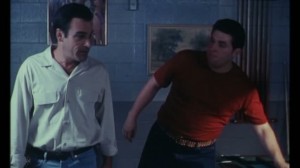 It’s when Jack and Jim find themselves up against their wealthy immovable objects, two wealthy, theoretically gullible brothers (played by Charles Durning and Joel Grey) that the movie finally calms down.
It’s when Jack and Jim find themselves up against their wealthy immovable objects, two wealthy, theoretically gullible brothers (played by Charles Durning and Joel Grey) that the movie finally calms down.
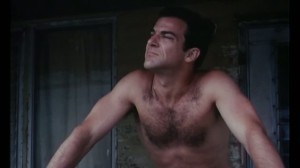 Durning and Grey function as straight men for us, whatever Jack and Jim throw at them, comes right back on their own heads, and often passed down to the brother’s butler/servant/groundskeeper played M. Emmet Walsh. Now Walsh is also a rock for Jim and Jack to push up the hill only to crush them as they try to manipulate him. And Haas’ simplistic literal adaptation, something he did effectively with Angels and Insects, though with a much larger visual canvas than what Auster’s story offers, is helpful in laying out, very directly, our own moral debate, where our sense of social obligation bumps up against our moralistic outrage. Not to mention the fact that he crafts a scene where Patinkin has an excuse a chance to sing in his uniquely operatic fashion. How bad could a two-hander be if the characters are given an opportunity to randomly break out in song?
Durning and Grey function as straight men for us, whatever Jack and Jim throw at them, comes right back on their own heads, and often passed down to the brother’s butler/servant/groundskeeper played M. Emmet Walsh. Now Walsh is also a rock for Jim and Jack to push up the hill only to crush them as they try to manipulate him. And Haas’ simplistic literal adaptation, something he did effectively with Angels and Insects, though with a much larger visual canvas than what Auster’s story offers, is helpful in laying out, very directly, our own moral debate, where our sense of social obligation bumps up against our moralistic outrage. Not to mention the fact that he crafts a scene where Patinkin has an excuse a chance to sing in his uniquely operatic fashion. How bad could a two-hander be if the characters are given an opportunity to randomly break out in song?
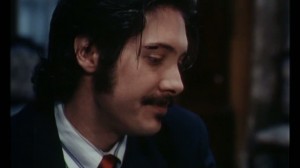 * It often leads to one of my other least favorite lazy ways to describe a story in a denigrating fashion; “The plot, such as it is.” Or the other one; “The plot, if you could call it a plot.”
* It often leads to one of my other least favorite lazy ways to describe a story in a denigrating fashion; “The plot, such as it is.” Or the other one; “The plot, if you could call it a plot.”
P.S. Note that my screenshots are widescreen and from a DVD. As the film is only available on DVD in Europe, the only way to accomplish this is to use the Region 2 full frame disc, which is open matte, and matte the top and bottom of the frame. You’ll know when to stop cropping the top when you can no longer see the boom mike, which is visible in dozens of shots in the open matte version. Or you can track down the widescreen laserdisc which pops up on Ebay every so often.



